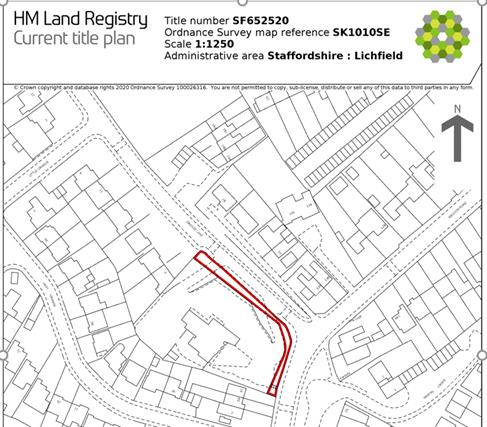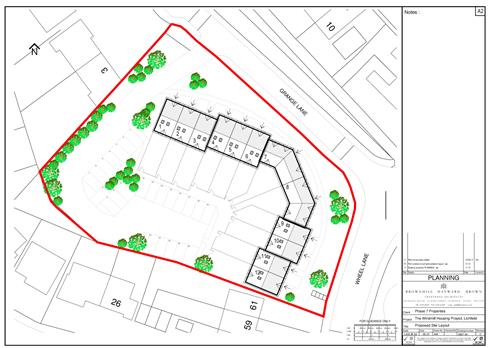Freely Available British and Irish Public Legal Information
[Home] [Databases] [World Law] [Multidatabase Search] [Help] [Feedback]
United Kingdom Upper Tribunal (Lands Chamber)
You are here: BAILII >> Databases >> United Kingdom Upper Tribunal (Lands Chamber) >> Unknown v Lichfield District Council (COMPULSORY PURCHASE - Compensation - strip of unregistered land with untraceable owner) [2020] UKUT 304 (LC) (12 November 2020)
URL: http://www.bailii.org/uk/cases/UKUT/LC/2020/304.html
Cite as: [2020] UKUT 304 (LC)
[New search] [Contents list] [Printable PDF version] [Help]
|
UPPER TRIBUNAL (LANDS CHAMBER)
|
|
|
UT Neutral citation number: [2020] UKUT 304 (LC)
UTLC Case Number: ACQ/337/2019
TRIBUNALS, COURTS AND ENFORCEMENT ACT 2007
COMPULSORY PURCHASE - Compensation - strip of unregistered land with untraceable owner - site assembly to enable redevelopment of former public house with planning consent - no access to site without subject land - likely claim for adverse possession - valuation as amenity land
IN THE MATTER OF A NOTICE OF REFERENCE
|
|
|
|
|
|
BY
|
|
|
|
LICHFIELD DISTRICT COUNCIL |
Acquiring Authority |
|
|
|
|
|
|
Re: Land at Former Windmill Public House, Grange Lane, Lichfield, Staffordshire, WS13 7ED
|
|
Mrs Diane Martin MRICS FAAV
Determination on written representations
© CROWN COPYRIGHT 2020
No cases are referred to in this decision.
Introduction
1. This is a decision to determine the amount of compensation to be paid into Court by Lichfield District Council (“the acquiring authority”) in respect of its compulsory acquisition of the freehold interest in 346 sq m (0.09 acres) of grassland to the north east of the former Windmill Public House, at Grange Lane, Lichfield, Staffordshire WS13 7ED (“the property”). The owner of the property is unknown and there is therefore no respondent to the reference.
2. The interest was acquired by general vesting declaration pursuant to the Lichfield District Council (Grange Lane, Lichfield) Compulsory Purchase Order 2018 (“the Order”). Title vested with the acquiring authority on 29 August 2019, which is the valuation date.
3. The acquiring authority made the order to enable site assembly by Phase 7 Properties Limited (“Phase 7”) which holds the freehold interest in the site of the former Windmill Public House (“the development site”) and gained planning consent on 19 February 2018 to redevelop it for residential use to provide 12 dwellings “the planning consent”.
4. I have read the witness statement of Karen Cannon, Property Services Manager with Lichfield District Council, dated 22 October 2019. This sets out the actions taken by Phase 7 and the acquiring authority to trace the owner of the property. It also sets out the procedures followed by the acquiring authority in making the Order. I am satisfied that all reasonable steps have been taken in both regards.
5. The reference was made to the Tribunal under section 5 and schedule 2 to the Compulsory Purchase Act 1975 and section 8 of the Compulsory Purchase (Vesting Declarations) Act 1981 and was received on 10 September 2019.
Evidence
6. The reference was supported by a valuation report dated 26 February 2019 written by Mr Kenneth A Shirer BA(Hons) MRICS, Principal Surveyor and RICS Registered Valuer with DVS, the Property Services arm of the Valuation Office Agency. He had inspected the property on 21 February 2019 and assessed its value for compensation at £4,250. That valuation was based on the following two special assumptions, in which Mr Shirer referred to the development site as “the back land”:
“1. That the property holds no ransom on the back land and that all necessary registrations of all rights of way by prescription or acquisition by adverse possession have been completed to enable the redevelopment of the back land.
2. The subject land will not form part of the developable area either in accordance with planning permission reference 17/01477/FULM or any future amended planning permission.”
7. Directions were issued for a case management hearing, which took place on 17 July 2020 with the acquiring authority’s solicitor, Lucy Thomas of Pinsent Masons, and their Property Services Surveyor, Mr Paul James. At that hearing I explained that the assumptions made by Mr Shirer in his report had a potentially significant impact on the value of the property but were apparently contrary to the true facts. In particular, and contrary to the special assumptions, the development site could only be accessed over the property and the planning consent obtained by Phase 7 included the property within its site area. Moreover, the report stated that it was valid for six months from 26 February 2019 and had therefore ceased to be valid by the valuation date of 29 August 2019.
8. My order of 17 July 2020 directed that legal advice should be taken on the matter of subsisting rights of access over the property and a new expert report commissioned to value the property in the light of that advice.
9. A letter of advice dated 4 September 2020, was sent to Mr James by Rebeca Rowley of Pinsent Masons, referring to the property as “the GVD land” and the development site as “The Windmill”. It reviewed the registered title of the development site, alongside observations of access and maintenance activities carried out on the property by previous owners of the development site, and concluded:
“5.1 Based on the information available to us, it is our view that any purchaser of the GVD land would likely be advised that:
5.1.1 it was potentially subject to an adverse possession claim by the owners of The Windmill, meaning they would then need to carry out due diligence to establish the validity and likelihood of such a claim; and
5.1.2 it was potentially subject to a prescriptive right of access, utilities easements and right of support for The Windmill, albeit those rights may be limited to use of The Windmill as a public house.
5.2 In our view there is a fairly low risk that the 1970 conveyance [referred to in the registered title of the development site] would be discovered to include a specific easement for the benefit of the adjoining pub site. However:
5.2.1 the owner of The Windmill could have a strong claim to adverse possession of the GVD Land;
5.2.2 it appears very likely that the owner of The Windmill could demonstrate a prescriptive right of access over the GVD Land for the use of the land as a public house or for whatever use The Windmill has been put since the public house closed, but it is less likely that they could show a prescriptive right of access that would be sufficient to support a proposed redevelopment of the site for residential use;
5.2.3 The Windmill may have acquired prescriptive utilities easements such as a right of free passage of surface water drainage over the GVD Land, although we have not considered the routes of these to establish whether in practice they currently or in the past have run over the GVD Land. Again, if such a right had been acquired it may not be sufficient to allow a residential development to proceed given the possible intensification.
5.2.4 it appears very likely that the owner of The Windmill could demonstrate a prescriptive right of support over the GVD Land. Although that right of support may be limited to an extent to the original use (i.e. the public house) it is sometimes possible for a change of use to remain within the confines of the original prescriptive right. If this particular point needed a more definitive view it is something on which we would recommend Counsel be instructed to provide an opinion, with the benefit of the details of the intended development scheme.”
10. An expert report dated 16 September 2020 was prepared for the acquiring authority by Mr Mark D Weller BSc (Hons) MRICS, a Director in the valuation division of Lambert Smith Hampton and an RICS Registered Valuer. Mr Weller inspected the property on 20 August 2020 and prepared his report in the knowledge of the legal advice received from Pinsent Masons.
Factual background from Mr Weller’s report
11. The property is located at the intersection of Grange Lane and Wheel Lane approximately one mile north of Lichfield City Centre in an established residential location adjacent to the development site. It comprises an ‘L’ shaped embankment enclosing two sides of the development site which occupies an elevated position above it. It appears to have been maintained by the owners of the public house when it was trading but is currently an overgrown grass verge.
12. An extract from the Land Registry title plan, at Appendix 1, shows the position of pedestrian steps leading up over the property to the development site from Wheel Lane and two vehicular access points giving access over the property to the development site from Grange Lane. It is understood that these access routes were laid by previous owners of the public house to provide access to it.
13. The planning consent obtained by Phase 7 incorporated the property, which would remain as an embankment. The site plan for the development at Appendix 1 illustrates this. At the date of Mr Weller’s inspection the planning permission had not been implemented.
14. Mr Weller observed no evidence of contamination at the property, but carried out no audit. His on-site observations and planning research confirmed that the property has no independent development potential.
Valuation evidence
15. Mr Weller’s valuation assumed that the owner of the development site would have a strong claim to adverse possession of the property which would eliminate the ability of its owner to extract ransom or marriage value from owner of the proposed development site.
16. Mr Weller valued the property as amenity land and provided evidence of 13 sales of small parcels of amenity land between May 2018 and August 2019. The size of the parcels ranged from 0.015 acres to 3.4 acres, but only two exceeded one acre. In order to include sufficient similar evidence, sales were derived from locations further afield than would be usual and included land near Burntwood, Stafford, Walsall, Stoke-on-Trent, Rowley Regis, Coventry, Cannock, Solihull, Nuneaton and Wolverhampton. Several of the parcels were described as housing estate verge/open space so had similar characteristics to the property.
17. The prices achieved for the comparative evidence ranged from £5 to £25 per sq m and Mr Weller valued the property as at 29 August 2019 at £12 per sq m to reflect its size, quality and topography. This achieved a value £4,152 which he rounded to £4,150.
Disposal
18. I have considered Mr Weller’s report, the legal advice on which he based his assumption that no ransom value could be extracted, and the comparable evidence which he provided. I agree that the assumption is an appropriate one and I am satisfied that Mr Weller’s opinion fairly reflects the open market value of the property. The compensation that should be paid into Court by the acquiring authority is £4,150.
19. Mr Weller’s report makes reference to the additional claims which a dispossessed owner might have for reimbursement of professional fees and for basic loss payment at 7.5% of the value of the interest. He assesses the potential claim for fees at £5,000 plus VAT and the basic loss payment at £311.32.
20. Those claims would need to be made in writing by the claimant to the authority within six years of the valuation date, 29 August 2019. In the absence of any claim, the Tribunal is not able to make an award of compensation, so payment into Court of those sums will be at the discretion of the acquiring authority.
Mrs Diane Martin MRICS FAAV
12 November 2020
APPENDIX 1


